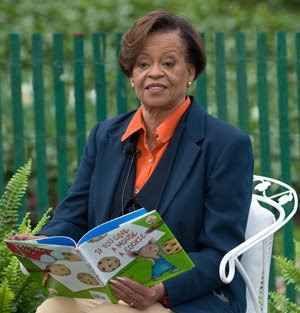First Lady's mother reads to students, talks about her life in the White House

WASHINGTON (AP) — First lady Michelle Obama’s mother summed up her life at the White House in one word: wonderful.
Marian Robinson says the mansion is “much bigger than anything I’ve ever been accustomed to” and has “lots of people to take care of you.” But the people she moved here to care for — granddaughters Malia and Sasha — are growing up so fast she’s beginning to feel “left out.”
Robinson, 71, provided a glimpse into her life at 1600 Pennsylvania Ave. after she read “The Napping House” to a group of elementary school students from Montgomery County, Md., at the Education Department’s outdoor plaza on Wednesday. The story is about a grandson, a dog, a cat and a mouse who fall asleep on top of a grandmother but are awakened by the commotion after a flea bites the mouse.
Robinson appeared as part of a weekly summer reading series put on by the department.
President Barack Obama’s mother-in-law rarely speaks in public.
But she answered more than a dozen questions from the students on topics ranging from her life and the White House itself to how it feels having a daughter married to the president of the United States and whether she is rich.
“Let me say this. No, I am not rich,” Robinson told the boy who asked. “But that just lets you know that you just need to earn enough money to pay your way and you can still be happy and still be in a place where you never thought you would be.”
She said Malia, 11, and Sasha, 8, don’t watch much television, but they do read and play games.
“I think they can only watch an hour a day,” Robinson said. “But they are at an age now where they’d rather read books or play games with themselves so grandma is beginning to feel left out. I spend a little time with them, but they’re growing up now.”
Robinson lived separately from the Obamas in Chicago and helped shuttle her granddaughters around when their parents were out of town during the presidential campaign. She moved to the White House to continue looking after the girls.
Overall, she said, hers is a wonderful life.
“I’m able to take care of my two grandchildren when their mother’s busy and she is pretty busy these days, and I am glad to be taking care of them,” Robinson said. “So my life is wonderful.”
Barack Obama has always been very hardworking, she said, and “he still is the hardest working person I know. I sometimes wonder how he does it, and Michelle, but then that’s what it takes to get things done, is hard work.”
Having a daughter married to the president is overwhelming, Robinson said, “especially when you come from the South Side of Chicago and your children went to public school and they just led normal everyday lives.”
“So it’s a very overwhelming feeling,” she said, adding: “mostly, it makes me very proud.”
© 2009 Associated Press. All rights reserved. This material may not be published, broadcast, rewritten or redistributed.
Labels: Reading, White House
